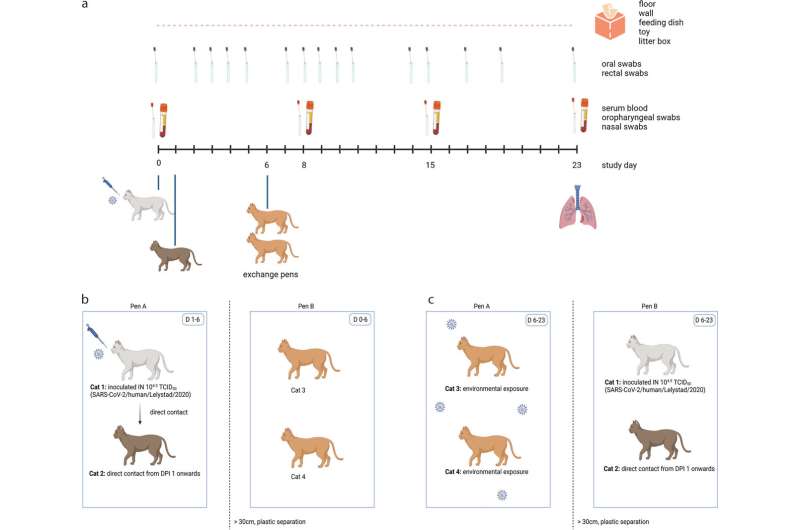This article has been reviewed according to Science X's editorial process and policies. Editors have highlighted the following attributes while ensuring the content's credibility:
fact-checked
trusted source
proofread
Cats can play a role in transmitting COVID-19, finds new study

Cats can play a role in the transmission of SARS-CoV-2 and their contaminated environment (pens in this study) can be infectious, according to new research. The study is published in Microbiology Spectrum.
"In practice, after the introduction of SARS-CoV-2 in our household, we should see our cat as part of the family regarding virus transmission," said study co-author Wim van der Poel DVM, Ph.D., Professor of Emerging and Zoonotic Viruses, Wageningen University and Research, in the Netherlands.
Dr. van der Poel and colleagues conducted the study to gain better insight into the risk of COVID-19 infection that could arise from cats infected with SARS-CoV-2. In the study, 16 cats were either directly exposed to SARS-CoV-2 virus obtained from a naturally infected human patient, exposed indirectly from a directly exposed cat, or exposed from the pen in which an infected cat was housed. All cats were regularly sampled during the whole study. Nasal samples, oropharyngeal samples, blood samples and environmental samples were tested for SARS-CoV-2. Blood samples were also tested for SARS-CoV-2 antibody development.
The cats were sampled during a period of three weeks, starting on the day of direct exposure to the virus. Nasal samples and oropharyngeal samples were taken three times during this period. Oral and rectal samples were taken 15 times during this period. Transmissions of SARS-CoV-2 between cats, through both direct and indirect contact, were evaluated.
The researchers found that cats are susceptible to SARS-CoV-2 and infected cats can spread the virus to other cats and into their environment. They also found that the contaminated environment can be infectious, but this infectiousness decays rapidly.
"SARS-CoV-2 transmission between cats is efficient and can be sustained," said Dr. van der Poel. "Infections of cats via exposure to a SARS-CoV-2-contaminated environment cannot be discounted if cats are exposed shortly after contamination."
The mean duration of infectiousness was a little more than one-third of a day. The duration of infectiousness was calculated from the periods that virus was detected in excreta (oral/nasal fluid or feces).
"We did not expose humans to the infectious cats. Our animal handlers were always fully protected," said Dr. van der Poel. "We must assume that cat owners can be infected by SARS-CoV-2 infected cats since these cats excrete infectious virus."
The researchers said they will continue to study SARS-CoV-2 susceptibility in different animal species and focus on virus transmission risks.
More information: Nora M. Gerhards et al, Efficient Direct and Limited Environmental Transmission of SARS-CoV-2 Lineage B.1.22 in Domestic Cats, Microbiology Spectrum (2023). DOI: 10.1128/spectrum.02553-22



















